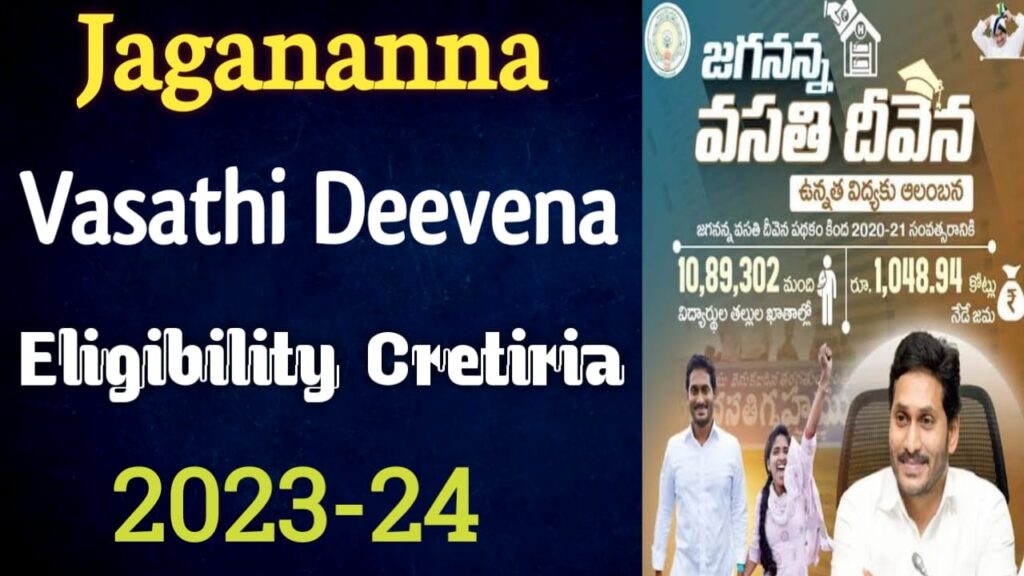Jagananna Vasathi Devena Introduction
- Overview of Jagananna Vasathi Devena program
- Providing quality education to all children is important for several reasons. Firstly, education is a fundamental right of every child, and denying access to education can limit their opportunities and potential in life. Education is also a key factor in reducing poverty and inequality by providing individuals with the skills and knowledge to secure better employment and economic opportunities.
- Moreover, quality education can help individuals develop critical thinking skills, creativity, and problem-solving abilities, which are essential for personal and professional growth. Education can also promote social inclusion by breaking down barriers and promoting understanding and empathy among different groups in society.
- In addition, providing quality education to all children can have a positive impact on the wider community and society as a whole. Educated individuals are more likely to be engaged in civic activities, vote, and contribute to the development of their communities. They are also more likely to promote positive values and behaviors and to be active in promoting social and environmental causes.
- Therefore, it is important to ensure that all children have access to quality education, regardless of their socioeconomic background, gender, ethnicity, or religion. Programs like Jagananna Vasathi Devena aim to address this issue and provide a pathway for underprivileged children to access quality education and achieve their full potential.
- Significance of the program in Andhra Pradesh

Background of Jagananna Vasathi Devena
- Launch of Jagananna Vasathi Devena by the Andhra Pradesh government
- Objectives and goals of the program
- Eligibility criteria for students to avail of benefits under the program
Benefits of Jagananna Vasathi Devena
- Financial assistance for students from underprivileged backgrounds
- Provision of hostel facilities
- Free education and textbooks
- Additional benefits for girl students
Implementation of Jagananna Vasathi Devena
- Role of Government in the Implementation of the Program
- Challenges faced during implementation
- Impact of the Program on the education system in Andhra Pradesh
Success Stories of Jagananna Vasathi Devena
- Real-life examples of students who have benefited from the program
- Improved access to quality education for children in Andhra Pradesh
- Role of Jagananna Vasathi Devena in promoting inclusivity and reducing dropout rates
Comparison with Other Education Programs
- Similarities and differences with other education programs in India
- Advantages of Jagananna Vasathi Devena over other programs
- Potential for replication of the program in other states in India

Criticisms and Challenges
- Criticisms of the program by opposition parties
- While providing quality education to all children is an important goal, many challenges can arise during the implementation of programs like Jagananna Vasathi Devena. Some of these challenges include:
- Funding: One of the biggest challenges is securing funding to support the program. Providing quality education can be expensive, and it may be difficult to obtain the necessary resources and support to fund the program.
- Infrastructure: Providing quality education requires adequate infrastructure, including classrooms, libraries, laboratories, and other facilities. However, in many cases, schools lack the necessary infrastructure, which can make it difficult to implement the program effectively.
- Teacher training: Teachers play a crucial role in providing quality education. However, many teachers may lack the necessary training or qualifications to effectively teach students, particularly in areas with limited resources.
- Equity: Ensuring equity in education can be a challenge, particularly in areas with high levels of poverty and inequality. Students from disadvantaged backgrounds may face additional barriers to accessing quality education, such as discrimination, social exclusion, and lack of resources.
- Parental involvement: Parents play a key role in supporting their children’s education. However, in some cases, parents may lack the necessary resources or education to provide adequate support to their children.
- Cultural and linguistic differences: Cultural and linguistic differences can create barriers to learning, particularly for students from minority or immigrant communities. Teachers may need to adapt their teaching methods to ensure that all students can participate and learn effectively.
- Despite these challenges, programs like Jagananna Vasathi Devena are important steps toward providing quality education to all children and addressing inequality in education. By identifying and addressing these challenges, it may be possible to create more effective and equitable education systems that support the needs of all children.
- Potential solutions to address these challenges

Conclusion
- Recap of the importance and benefits of Jagananna Vasathi Devena
- The success of the program in providing quality education to underprivileged children
- Prospects of the program and its impact on the education system in Andhra Pradesh
FAQs
- What are the eligibility criteria for students to avail of benefits under Jagananna Vasathi Devena?
- Is the program limited to students from a particular caste or religion?
- How has Jagananna Vasathi Devena impacted the education system in Andhra Pradesh?
- What are the long-term benefits of the program for the students and the state?
- Can the program be replicated in other states of India?

Jagananna Vasathi Devena: Providing Quality Education for All Children in Andhra Pradesh
Jagananna Vasathi Devena is a flagship program launched by the Andhra Pradesh government in 2019 to provide quality education to all children in the state, regardless of their socio-economic background. The program provides financial assistance for students from underprivileged backgrounds, free education and textbooks, and hostel facilities to ensure that students have access to quality education.
The importance of providing quality education to all children cannot be overstated. Education is a fundamental right of every child and a crucial factor in their personal growth and development. It empowers children with the knowledge and skills necessary to succeed in life and contribute to society. Unfortunately, millions of children in India are still deprived of this basic right due to financial constraints and social barriers. Programs like Jagananna Vasathi Devena aim to bridge this gap and ensure that every child has access to quality education.
Jagananna Vasathi Devena was launched in June 2019 by the Andhra Pradesh government. The program aims to provide free education, textbooks, and hostel facilities to students from underprivileged backgrounds. Under the program, students from economically weaker sections, Scheduled Castes (SC), Scheduled Tribes (ST), and Other Backward Classes (OBC) are eligible for financial assistance. The program also provides additional benefits for
